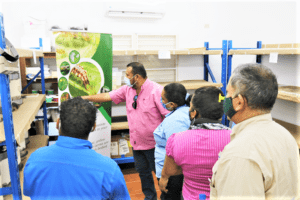This programme is of economic importance to Belize and the OIRSA region. It started in 1999, when the pink mealybug was detect ed in Belize, and OIRSA, through its emergency funds, assisted along with IICA, CARDI and USDA/APPHIS for the rapid control and prevention of its reach to other Central American countries.
In 2019, the pink hibiscus mealybug lab was restructured to accommodate the production of two natural pest control insects known as Trichogramma pretiosium and the Chrysoperla carnea, also known as the green lacewing. These two natural predators showed potential use for farmers in Belize and for the region.
The Trichogramma pretiosium is a wasp of about 0.5 mm long, which parasitizes eggs of pest like lepidopteras. When the wasp egg hatches, the larvae feeds inside the moth egg, killing it by default. These wasps target pests like sugarcane borer, cornstalk borer, corn earworm, fall armyworm, diamond back moth, and cabbage loopers, among others. The Chrysoperla carnea (green lacewings) adult feeds on nectar, pollen, and mildew, while the larvae feed on insect pest eggs, larvae, nymphs, and sometimes adult pests. The larvae feed for two to three weeks on soft-bodied insect pests; they target pests such as aphids, whiteflies, thrips, caterpillars, leafhoppers and mealybugs.
These natural predators are clean and environmentally safe for use. They are effective and will assist farmers in reducing chemical pesticides normally used in their production management. If the pest population is drastically reduced, the adult insects will fly off in search of food in other bushy areas.
Present at the launch were Hon. Jose Abelardo Mai, Minister of Agriculture, Food Security and Enterprise; Mr. Fermin Blanco, OIRSA country representative in Belize; Mr. Servulo Baeza, Chief Executive Officer in the Ministry of Agriculture; Mr. Francisco Gutierrez, Acting Managing Director, Belize Agricultural Health Authority; Ms. Omaira Avila, CARDI representative; and representatives from the Belize Livestock Association, Pesticides Control Board, and the Ministry of Agriculture. Virtually present were Efrain Medina Guerra, Executive Director of OIRSA; and Dr. Carlos Urias, Regional Director for Plant Health, OIRSA.
Pictures of the Biological Control Programme Launched




